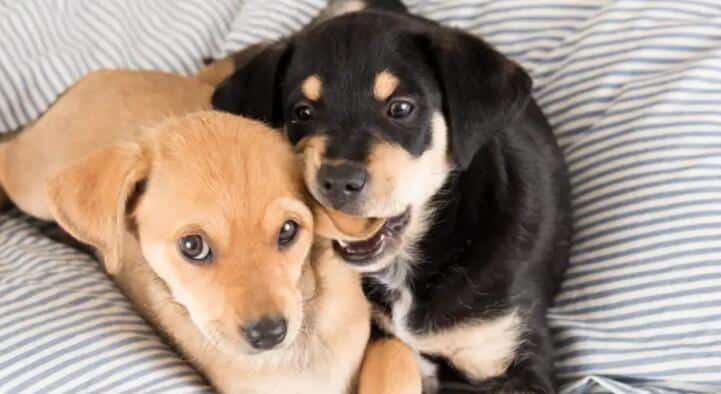The best way to stop a puppy from biting you or others is to teach him a new behavior. One of the most effective ways to redirect a puppy’s biting or nipping habit is to replace his intended target with a soft toy or chew treat.
11 EASY STEPS TO TEACH A PUPPY NOT TO BITE
Follow these easy steps to stop your puppy from biting and nipping during playtime.
Before his teeth reach flesh, let out a high-pitched yelp. This will let him know the behavior is unwelcome.
Offer a soft toy to replace biting or nipping on your hand or fingers.
Praise your puppy or reward him with a small treat for chewing on the toy instead.
When your puppy bites and holds your hand, do not pull away, firmly but gently say no or leave it and wait for your puppy to release you from his bite.
Ignore your puppy for at least 30 seconds.
When your puppy lets go of your hand, give your puppy praise or a chew toy.
If your puppy continues to bite or nip, drop the toy to signal the end of playtime.
Get up and leave or walk away from your puppy.
Do not punish your puppy with a long waiting period before playtimes, he can only learn through regular interaction.
Never shout, intimidate, or physically punish a puppy.
Always be consistent and follow the same teaching method every time you play with your puppy. This way your puppy learns about bite inhibition and that he can hurt you.
STOP PUPPY BITING 101
Puppies learn social behavior through playtime with their littermates, which often involves biting or nipping at each other. If one puppy bites another too hard, you’ll hear a loud yelp after which the hurt pup will end play, walk away, and ignore his enthusiastic playmate.
Your playtime interactions should be similar with your puppy. With enough repetition of this easy training method, he’ll soon understand that this behavior is not welcomed.
TIPS FOR PLAYING WITH YOUR PUPPY
As a pet parent, you set the tone for each playtime. This also applies to aggressive playing that could indicate to your pup that it’s fun until someone is hurt, like a child.
All family members need to understand that consistent, non-aggressive play is what a puppy needs to learn so that he will not accidentally bite or nip someone unexpectedly.
Some tips for playing together include:
Playtimes must be initiated by human family members, not a puppy.
Never rough-house with a puppy, that’s not what you want him to learn.
Always have toys readily available to offer him instead of a hand or finger.
To stop puppy biting, yelp out loud, withdraw attention for a few seconds.
Have a consistent daily schedule for your puppy that includes giving him attention, time to explore, and exercise.
Play chase and retrieve or tug-o-war games with different toys.
Redirect puppy energy by taking him on age-appropriate walks.
Ensure that all family members use the same 11 step plan to teach a puppy not to bite or nip.
Monitor puppy playtimes with children and teach them not to provoke a puppy through close head-to-head contact.
